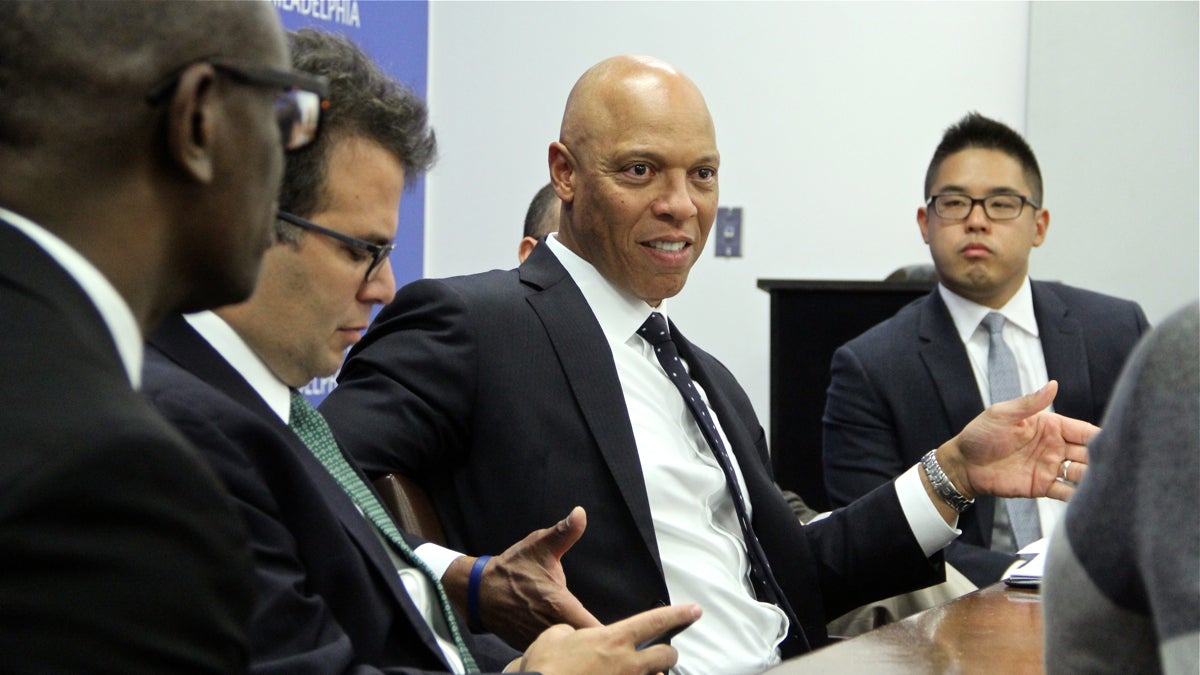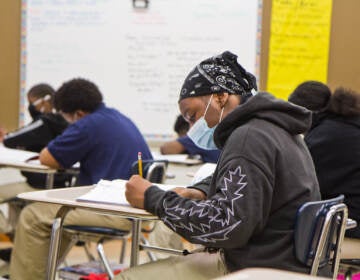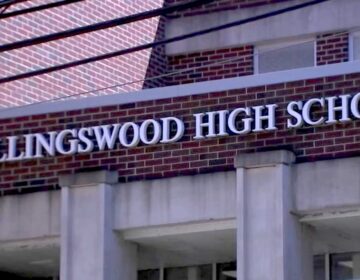Without cigarette tax, Philly schools chief says layoffs to begin Aug. 15

Philadelphia Schools Superintendent William Hite. (Emma Lee/WHYY)
After winning a major victory in the Pennsylvania House of Representatives last week, the proposed cigarette tax for Philly schools appears stalled in a game of legislative pingpong.
The Senate Tuesday sent the bill back to the House by adding amendments, and now the House isn’t scheduled to reconsider the measure until Aug. 4.
School leaders say that leaves plans for opening schools in September in total disarray.
The school district has been counting on the $2-per-pack cigarette tax as a recurring source of funding in the face of a $93 million budget gap.
Without swift passage, Superintendent William Hite said 1,300 staffers would be laid off, and classrooms would see student-teacher ratios swell to as great as 41 to one.
In order to avoid what he says would be a dangerous, unsafe school system, Hite has also been considering saving money by truncating the state-mandated 180-day school year.
“I’ve indicated over and over again that I have no intention of putting 40 children in a classroom. I have no intention of reducing services beyond where they’ve been reduced,” he said Wednesday.
Hite stressed that, without additional funding, major decisions would need to be made by mid-August.
“If in fact we don’t have a path forward by Aug.15 … we would have to begin sending out layoff notices, and those layoff notices would be based on whatever [money] we have or do not have at that point in time,” he said.
A spokesman for House Republicans said it would be difficult to approve the cigarette tax as passed by the Senate because of provisions jammed into the omnibus legislation.
In an interview Tuesday, House GOP spokesman Stephen Miskin expressed criticized the Senate for adding other provisions to the bill, including authorizing hotel tax increases in municipalities such as York and allocating funds for City Revitalization and Improvement Zones.
“It will very difficult to pass House Bill 1177 if it is loaded with all these hotel taxes and new CRIZs which could cost the state up to $70 million,” said Miskin. “We certainly preferred legislation focused on quality education for the kids in Philadelphia.”
In short: Legislative debates over hotel taxes and CRIZs that have nothing to do with Philadelphia are preventing the cigarette tax legislation from moving swiftly to Gov. Tom Corbett.
Hite calls delay ‘very unfortunate’
“We’re talking about impacting the education of children in the city of Philadelphia because of things that are, No. 1, not connected to Philadelphia,” said Hite. “And then, No. 2, are steeped in politics. So that is very unfortunate.”
These debates come in addition to the amendment offered Tuesday by Senate Majority Leader Dominic Pileggi, R-Delaware, that puts a five-year limit on the cigarette tax.
That provision was added as tobacco lobbyists swarmed Harrisburg following the cigarette tax’s dramatic victory in the House last week, Senate Democrats said.
Hite said adding this “sunset” to the legislation hurts the district’s fiscal future.
“Part of why we’re in this predicament is because there have been a series of one-time fixes,” he said. “It is concerning when you have a revenue source that is meant to be recurring that then sunsets after a period of time because it doesn’t provide you with the ability to plan long term.”
Corbett has said that, if it eventually passed by both legislative bodies, he’ll sign the cigarette tax bill into law. But his office says it has little power to compel the General Assembly to come to a consensus more quickly.
The governor could call the legislature into a special session, but the legislature would set the calendar.
“The administration doesn’t, unfortunately, make the laws. We enact them and implement them,” said Corbett spokesman Jay Pagni. “This really does come down to the Speaker of the House.”
Miskin, spokesman for Speaker Samuel Smith, R-Armstrong, reiterated that the House would come back on Aug. 4.
Senate Democrats estimate that the Philadelphia School District loses $1.6 million every week the state delays implementing the cigarette tax.
Hite said he’s been informed that tax implementation would occur 45 to 60 days after the bill becomes law law.
Revenue estimates range from $40 million to $69 million
There have been competing reports of exactly how much the cigarette tax will generate. Analysis by Senate Democrats says the tax would raise $69 million for schools this year if implemented by Sept. 1.
A city analysis says $40 million to $45 million would be generated for schools in the first year of implementation and double that for years to come.
The district has been going by the lower figure until the bill passes and the State Revenue Department gives its official estimate.
“We’re losing money the longer its delayed,” said Hite. “And that’s problematic for us.”
Depending on exactly how much money the cigarette tax generates, the school district will still have work to do to close its $93 million budget gap.
On Monday, Mayor Micheal Nutter hinted that the city may find additional funding for the district as it completes its end of fiscal year accounting. Nutter, though, wouldn’t elaborate.
That possibility was news to Hite.
“I can’t … shed any light on that,” said Hite, adding he was “surprised by that statement and encouraged.”
Beyond closing the $93 million gap, Hite has asked for $224 million to begin implementing his vision for district growth.
As the political maneuvering around the cigarette tax extends into August, that possibility seems highly unlikely.
WHYY is your source for fact-based, in-depth journalism and information. As a nonprofit organization, we rely on financial support from readers like you. Please give today.





